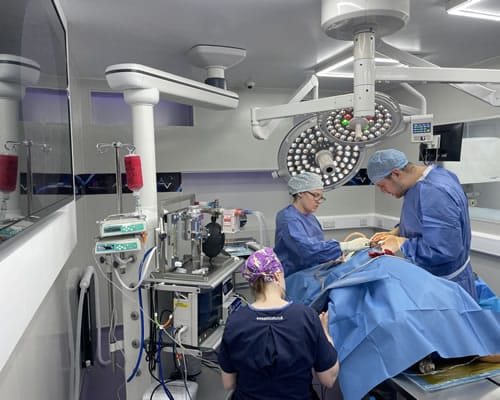Pet Neutering
Neutering is the medical term for removal of the sexual reproductive organs of the animal. The term “spay” is used when referring to a female patient; where we remove the womb and ovaries, whereas the term “castrate” is used when we refer to male patients; surgical removal of the testicles.
In line with the ethos of prevention is better than a cure, we see many patients who are diagnosed with illnesses affiliated with the reproductive organs such as pyometra and testicular cancers, sadly for many patients these can be fatal. This is why both dog neutering and cat neutering are so important.
So, when is best to neuter your pet? At the start of your pet’s life, they are, in most cases, in their best health. A lot of the conditions that may increase the risk of surgery in patients are degenerative, meaning that they come with age. Your pet in their first years of life is most likely to be in their healthiest form. We therefore offer neutering to cats and dogs from 6 months of age, around the time of sexual maturity, however your veterinary surgeon will give advice for your pet from assessment.
What to expect on the day? Your pet will board with us for the day and will be back with you in the evening. We offer a blood test prior to the administration of any anaesthetic drugs to ensure that your pets’ vital organs are functioning well. The surgery will take place and your pet will need around 10–14 days to fully recover. We offer a free post-operative consultation for peace of mind that your pet is recovering well, and we are always at the end of the line.
Our advanced surgical techniques and detailed recovery plans ensure that the risks of neutering are reduced. Here at Anrich Vets, we pride ourselves on the high quality of care that we offer to all of our clients, to ensure that each and every pet receives an exceptionally high level of care during their neutering and aftercare. Neutering surgery does carry some risk, as does all surgery, but the risk is low, and the benefits more than outweigh any risk. Benefits of spay or castration include:
- prevents unwanted pregnancy
- prevents the risk of testicular cancer in males, and uterus infections and cancers in females
- can reduce aggressive or roaming behaviour in males
- can reduce the risk of theft for breeding purposes
Phone 01942 242001 for more information.
Should I neuter my male?
Male dogs can be aggressive, neutering reduces testosterone and can help to reduce aggression.
Is it OK to neuter a female dog?
Neutering your female breed will prevent unwanted pregnancies and reduce the risk of certain cancers.
Is neutering painful?
It is a simple operation, your dog may be a little sore for a few days after the operation, but we will ensure that you have the best painkillers for your pet.
You may be interested in reading: Benefits of Neutering a Dog

